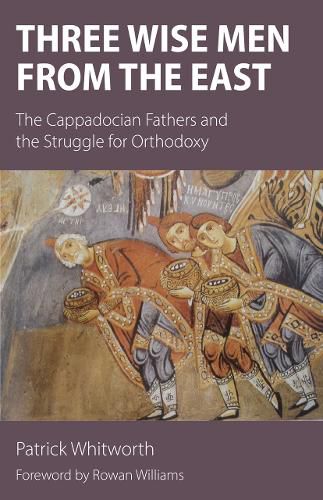Readings Newsletter
Become a Readings Member to make your shopping experience even easier.
Sign in or sign up for free!
You’re not far away from qualifying for FREE standard shipping within Australia
You’ve qualified for FREE standard shipping within Australia
The cart is loading…






This title is printed to order. This book may have been self-published. If so, we cannot guarantee the quality of the content. In the main most books will have gone through the editing process however some may not. We therefore suggest that you be aware of this before ordering this book. If in doubt check either the author or publisher’s details as we are unable to accept any returns unless they are faulty. Please contact us if you have any questions.
Includes a foreword by Rowan Williams, former Archbishop of Canterbury.
The Cappadocian fathers of the fourth century-Basil of Caesarea, Gregory of Nyssa and Gregory Nazianzen-produced thoughts on the Trinity, the creation, the incarnation, the holistic reading of scripture and the discipline of the soul which are playing a more seminal role in Christian theology today that at any time in the last four hundred years. Too often, however, their teachings are appropriated in a piecemeal manner, with no acknowledgement of their mutual interdependence.
In this comprehensive introduction to their writings, Patrick Whitworth enables the modern reader to share their understanding of the purpose and scope of theology. At the same time, he brings before us three strong personalities, who, like the rest of us, were children of time and place, taking up the pen to address a particular audience on particular occasions. Stripping out the ruling ideas from the polemical or rhetorical dress in which they have come down to us, he shows that the insights of genius lose nothing by being translated from the exquisite opacity of the original Greek into plain but accurate English prose.
Wonderfully comprehensive and clear. We are able to see the Cappadocians not as counters in the board game of controversy but as complex human figures wrestling with the challenges of internal and external crises for the Church. This will be a really welcome tool for all students of early Christianity, and excellent and accessible reading for anyone who wants to understand better the formative period of Christian teaching. It is a message that the Church of our own time should take very seriously.
$9.00 standard shipping within Australia
FREE standard shipping within Australia for orders over $100.00
Express & International shipping calculated at checkout
This title is printed to order. This book may have been self-published. If so, we cannot guarantee the quality of the content. In the main most books will have gone through the editing process however some may not. We therefore suggest that you be aware of this before ordering this book. If in doubt check either the author or publisher’s details as we are unable to accept any returns unless they are faulty. Please contact us if you have any questions.
Includes a foreword by Rowan Williams, former Archbishop of Canterbury.
The Cappadocian fathers of the fourth century-Basil of Caesarea, Gregory of Nyssa and Gregory Nazianzen-produced thoughts on the Trinity, the creation, the incarnation, the holistic reading of scripture and the discipline of the soul which are playing a more seminal role in Christian theology today that at any time in the last four hundred years. Too often, however, their teachings are appropriated in a piecemeal manner, with no acknowledgement of their mutual interdependence.
In this comprehensive introduction to their writings, Patrick Whitworth enables the modern reader to share their understanding of the purpose and scope of theology. At the same time, he brings before us three strong personalities, who, like the rest of us, were children of time and place, taking up the pen to address a particular audience on particular occasions. Stripping out the ruling ideas from the polemical or rhetorical dress in which they have come down to us, he shows that the insights of genius lose nothing by being translated from the exquisite opacity of the original Greek into plain but accurate English prose.
Wonderfully comprehensive and clear. We are able to see the Cappadocians not as counters in the board game of controversy but as complex human figures wrestling with the challenges of internal and external crises for the Church. This will be a really welcome tool for all students of early Christianity, and excellent and accessible reading for anyone who wants to understand better the formative period of Christian teaching. It is a message that the Church of our own time should take very seriously.